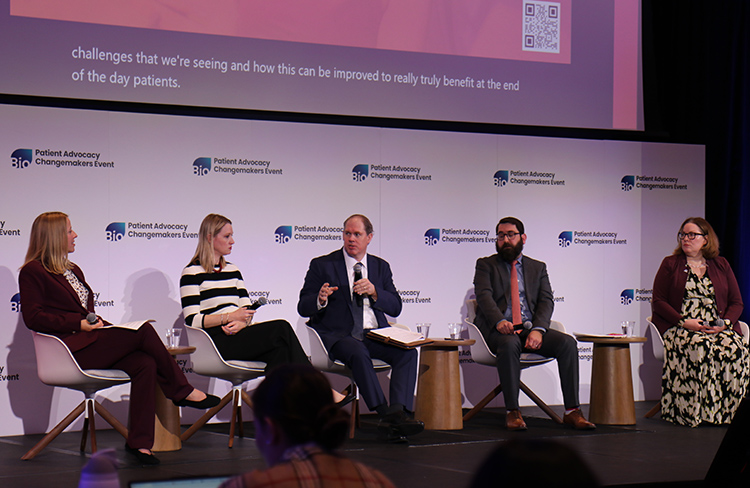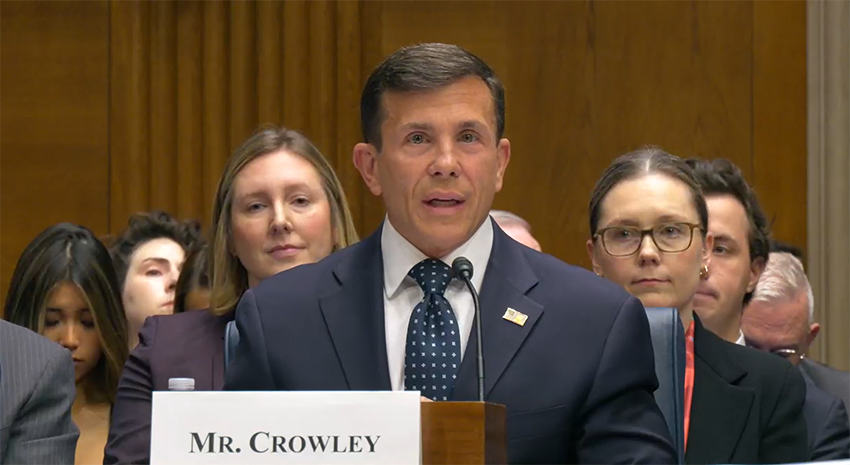Given the importance of intellectual property for biotech, the Biotechnology Innovation Organization (BIO) remains vigilant in ensuring IP is protected.
In recognition of World IP Day on April 26, Dr. Hans Sauer, BIO’s Deputy General Counsel and VP for Intellectual Property, surveyed the current policy landscape, noting opportunities and challenges.
“Stronger IP protection encourages drug research and investment, and enables patent holders to share medical breakthroughs worldwide,” said Sauer, an adjunct professor at Georgetown Law recognized as a leading expert in IP for biotech. “Ultimately, IP is what gets new medicines to patients.”
New administration targets faster patent approval
There are early indications that the Trump Administration is taking a fresh look at IP policy and considering some changes that could be helpful, according to Sauer.
He said it has been encouraging to see that the U.S. Patent and Trademark Office (USPTO) is not experiencing the kind of changes and cutbacks that are roiling other federal agencies.
“While we don’t have a new USPTO director yet, we do have what looks like a coordinated team in place,” Sauer said, adding that the team seems to be working toward improvements in the way they award patents.
“All indications are that they’re really going for enhanced efficiency, reducing the backlog of patent applications by speeding up efficiency of patent examination,” he explained. “What we’re hearing is that much of the effort will be on front-end quality of patents.”
Over the last 15 years or so, the USPTO has tended to work on the assumption that any conflicts over a patent could be resolved through appeals, an approach that can drag out the process and frustrates patent seekers, Sauer said.
“It seems the effort now is to focus on the principles of patent quality up front—getting it right the first time. If you make patents better in the front end, you won’t have to fight so much once they’re granted,” he said.
Another try on AI?
The new administration also offers hope for further improvements through its review of examination guidelines on AI and patents in the U.S.
Currently, based on a decision made in the last administration, only humans can hold patents, not AI. But the rules also imply that, if an innovation was predominantly designed by AI, it could potentially be argued that there was not sufficient human innovation added to warrant a patent. This distinction can cause confusion and makes U.S. patent implementation different from most other countries, Sauer said.
He advocated the system used In Europe, the UK, and Australia, where AI is considered a tool and the person using the AI is considered the inventor of any unique invention.
President Trump recently issued an Executive Order requiring review of all federal regulations and guidelines regarding AI. This could provide an opportunity to revisit the policy, which Sauer said would benefit from more public input.
“We’re hoping that review means we can have another round of public discourse about this, maybe workshops, maybe more conversation than was possible when the rule was first adopted,” Sauer said. “Robust public review is what we’re hoping for.”
Some concerning legislation
Six potentially problematic bills regarding patents were discussed in the previous Congress by the Senate Judiciary Committee and these could be brought up for a vote quickly, according to Sauer.
“We’re not very excited about any of them, but there are two that we’ll be watching especially,” Sauer said. “The most concerning is S.1040. It’s designed to regulate questions around what happens when a pharmaceutical company introduces improved, follow on, or second line products.”
As Sauer explained, pharmaceutical firms can improve existing drugs, for example by making an injectable into an oral pill or by tweaking a molecule. S.1040, the Drug Competition Enhancement Act, would allow the Federal Trade Commission (FTC) to determine whether companies making such improvements should be punished under antitrust or competition law.
“It could be a related molecule but now chemically different, something the Food and Drug Administration (FDA) would think of as a different chemical needing separate approval,” Sauer said. “But this bill would let FTC question whether the improvement has sufficient merit to be marketed in competition with generic copies. If it does not, innovators could be put under legal liability for offering improved versions of their drugs. This would have a strong chilling effect on innovation.”
Another bill, S.1097, the Interagency Patent Coordination and Improvement Act, would complicate regulation by unnecessarily involving more agencies in patent examination. This bill would seek to consider whether FDA should weigh in on patent decisions by the USPTO.
The bill makes assumptions that USPTO would be misled about the uniqueness of an invention without FDA guidance, even though that has essentially never happened, Sauer said.
“All that’s really going to do is to create inefficiencies in an effort to solve a problem that does not exist,” Sauer said. “I think it would create information bottlenecks in both agencies.”
International treaties
Export of U.S. drugs and international cooperation that goes into discovering and developing new drugs are essential to the biopharma industry’s ability to innovate new cures. BIO is therefore watching international treaties that could impact global IP.
Sauer said BIO is concerned about the WIPO Treaty on Intellectual Property, Genetic Resources and Associated Traditional Knowledge.
One part of the treaty would allow countries to claim plants, microbes, or wildlife growing in their country as a sovereign national resource. That would mean a fungus or bacteria with potential to be used for drug development could be claimed by one country as property—even if the species may grow elsewhere. Patent applicants who refer to such genetic resources in their patent applications would be required to explain how and where they were obtained so that countries could claim payment. This would add significant extra burden and complication for biotech inventors. “Countries are free to create rules for the collection and use of wild organisms within their borders,” Sauer said. “But the patent system is the wrong tool for policing them.”
Fortunately, he said, the U.S. is likely to reject this treaty, but BIO will remain vigilant, he added.
Another concerning international negotiation is the World Health Organization’s draft pandemic agreement. There are many problematic provisions in the draft agreement, which will continue to be hammered out, including one that would allow countries to trade the genetic code of viruses for free products or other valuable concessions. This could obviously be an impediment to drug development during pandemic emergencies, Sauer said.
As the U.S. is leaving the WHO, they will not be involved in negotiations around this agreement, but it could still impact the industry in the U.S., Sauer said.
“This requires, U.S. based innovative industries in the health space to think about how we can advocate even if our government is not at the table,” he explained. “It’s challenging but it’s the only way to make sure we can continue to cooperate globally and share our medical innovations with patients.”




